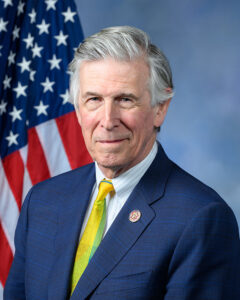A report by the Northern Virginia Regional Commission to the Falls Church City Council at a Council work session in City Hall Monday night painted an alarming picture of what the impact of the mass layoffs by the Trump administration of federal employees could mean for this region, including for Falls Church. It was the same presentation that was made to the State Legislature’s Emergency Committee on the Impacts of Federal Workforce and Funding Reductions held Tuesday in Alexandria.
Jill Kaneff, senior demographer, and Robert Lazaro, executive director of the NVRC, laid out the picture to the Council showing the outsized role of federal employees and contractors in the region, by far the highest percentages in the U.S., and therefore of the dire consequences of the “slash and burn” policies toward federal agencies that have been underway since Trump returned to the White House in January.
Perhaps the most telling data point cited job opportunities that have been diminished on listing boards due to declining government contract expectations. The numbers are down by half. For example, on the Fairfax County Economic Development Authority board the number of job opportunities posted in February 2025 was 45,000 compared to February 2024 when there were 90,000.
Of those jobs posted in February, only 30 percent were of comparable skill levels and the rest below and for lower paying jobs, according to the George Mason University Center for Regional Analysis.
Of the 81,139 federal civilian jobs in Northern Virginia, Falls Church has only 2,016, but that total represents the highest number of federal employees as a percentage of all City employees at 16.4 percent.
Overall, federal civilian jobs constitute 6.3 percent of total civilian jobs in Northern Virginia, and 2.7 percent of the nation’s federal civilian jobs are here.
Moreover, full and part-time jobs that are directly dependent on federal contracts are estimated to be 441,488, or 7.7 percent of the total workforce, according to the University of Virginia’s Weldon Cooper Center. It also reports that federal grants and contracts account for $109 billion, the highest amount for any state in the U.S. and 15.6 percent of the total for the U.S., which as a per capita number here is $12,718 compared to the overall U.S. average of $2,099.
The numbers underscore the vulnerability of this region to the federal layoffs.
What the NVRC has identified as “fiscal issues of heightened concern” in the report to the City Council were the following: 1. Safety net programs like Medicaid, the Affordable Care Act, SNAP, TANFand more, 2. The restaurant industry, 3. The hotel industry, 4. Office vacancy rates and 5. Tax revenue, including meals taxes, commercial property value decreases, sales tax declines from hotels and reduced consumer spending due to inflation from tariffs, and personal income tax losses.
The current number of safety net participants in the region who are facing cuts to the programs that they rely on include 151,303 helped through the Affordable Care Act, 131,533 on average monthly helped by SNAP, 7,232 on average monthly helped by the Temporary Assistance for Needy Families (TNAF) program, and 111,532 aided by Medicaid.
Falls Church Mayor Letty Hardi commented to her colleagues Monday that even though the City might be relatively better off going into this situation given its strong revenue projections for the coming fiscal year and plans for a real estate tax cut, it is important to be mindful of the pain that is being spread throughout the region.
Kaneff made the same presentation to the meeting in Alexandria Tuesday of the Emergency Committee on Impacts of Federal Workforce and Funding Reductions set up in Richmond last month to assess and recommend actions that may be needed to address the crisis being caused by the Trump actions. Falls Church’s Del. Marcus Simon is on that committee chaired by Fairfax County Del. David Bulova.
In addition to Kaneff and John Chapman, chair of the NVRC, testifying before the group convened at the Virginia Tech Innovation Campus were Weldon Cooper Center for Public Service economists Hamilton Lombard, Joao Ferrera and Terry Rephann, Northern Virginia Chamber of Commerce’s MarkComer, who is CEO of B.F. Saul Hospitality, Patrick Small, Economic Development Director of the City of Manassas, Alissa Tafti, chair of the Northern Virginia Labor Federation and Jeff McCay, chair of the Fairfax County Board of Supervisors.












